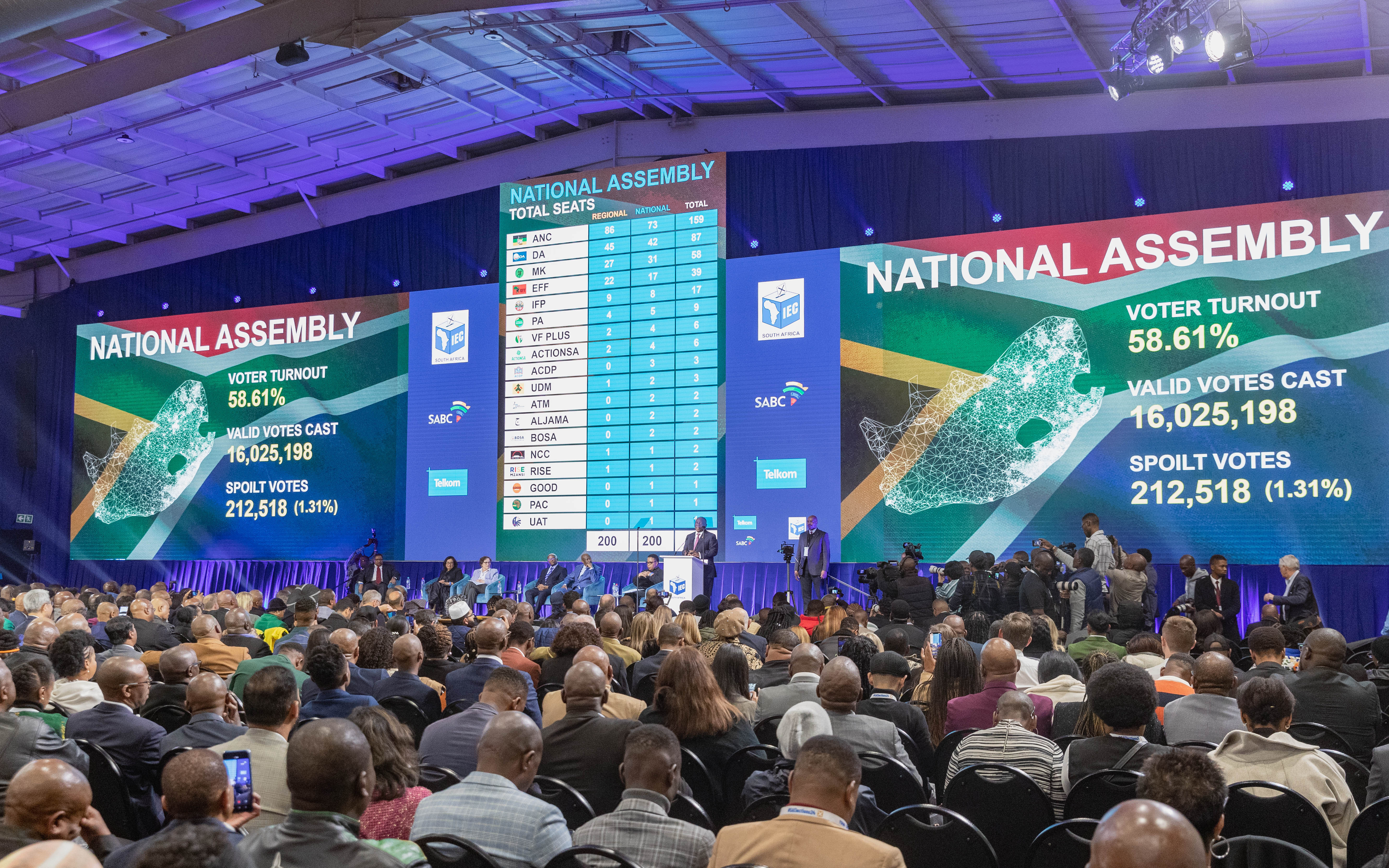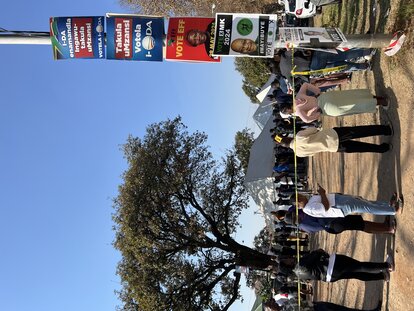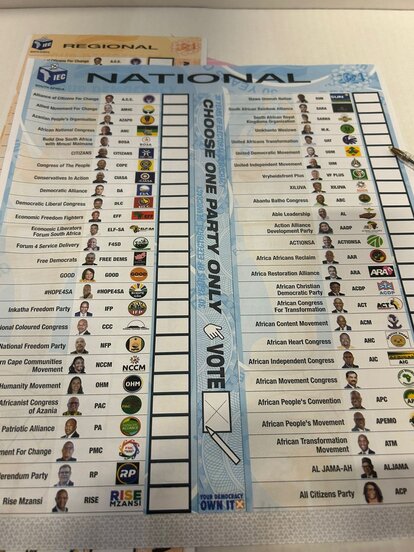South African Elections 2024
ANC loses majority after 30 years

Auf dem Bildschirm werden die endgültigen Ergebnisse der Sitzverteilung in der Nationalversammlung bei den südafrikanischen Parlamentswahlen 2024 gezeigt.
© picture alliance / Xinhua News Agency | Zhang YudongOn May 29, 2024, South Africa held its seventh general elections—a symbolic moment, 30 years after the abolition of apartheid and the first free elections of 1994. For many older South Africans, 1994 marked the beginning of a new era: the path to political enfranchisement, the first participation in democratic elections, and the liberation of the black population from decades of oppression, made possible by the leadership of Nelson Mandela and his party, the African National Congress (ANC). Since those historic elections, the ANC has governed the country uninterruptedly.
South Africa's political landscape is changing. This year's elections were considered the most significant since 1994 amid growing dissatisfaction with the ANC's governance, which many accuse of corruption and mismanagement. In this context, the question arises whether South Africa will experience another transformation and what the country's future will look like after three decades of democratic development.
On May 29, 2024, the polling stations opened at 7 a.m. and were officially supposed to close at 9 p.m. In many places, long queues formed. Many voters braved winter temperatures below 10°C and waited well into the night to vote. This willingness to endure hours of waiting reflected some voters' deeply rooted desire for change. An awe-inspiring example is a voter from Pretoria who reported on platform X that he waited in line for 13 hours. Some polling stations remained open late into the night to allow all voters to cast their votes. Overall, the elections can be considered free and fair.

Schlangen am Wahlzelt im Osten von Johannesburg.
© FNFDecline in Voter Turnout Due to Political Apathy?
Voter turnout was ultimately only 58.6%, lower than in previous elections. In 2019, turnout was still 66.1%, while in 1994, the first democratic elections saw 86.9% of registered voters casting their ballots. Long wait times and queues initially suggested a correspondingly high turnout. However, the number of voters was ultimately lower than hoped and expected. This could indicate increasing political apathy and a resulting loss of confidence in the political process.
An Embattled ANC and a Surging MK – Election Results at a Glance
The decades-long dominance of the ANC came to a crashing end in this historic election. The party suffered a heavy defeat with 40.2%, far below the targeted 45% and a loss of over 17 percentage points compared to 2019. Nevertheless, the ANC remains the strongest party, and a government without it as the senior partner is almost impossible. However, the drastic decline in voter support means that the ANC must seek one or even several coalition partners to continue governing and enable President Cyril Ramaphosa to secure a second and final term.
The three largest opposition parties seem to be the most likely coalition partners for the ANC. The Democratic Alliance (DA) achieved 21.8%, with a one percentage point growth and a stable position in the political centre, but continuing challenges regarding its perception as a party for whites. The newly formed MK Party of former President Jacob Zuma achieved an impressive 14.6%, immediately establishing itself as the country's third most significant political force despite minimal campaign presence and the "bad boy" reputation of its founder. The Marxist Economic Freedom Fighters (EFF) party, led by former ANC Youth League President Julius Malema, garnered almost 10%, becoming the fourth largest force.
South Africa, Quo Vadis?
The results of this election are pivotal for South Africa and will significantly influence the country's political direction. The ANC was punished, while MK and EFF, both splinters of the ANC, made significant gains. Combined, ANC, MK, and EFF still received nearly 65% of the votes, showing that many voters continue to support parties with roots in the ANC. The disappointing results of smaller parties like Rise, BOSA, and ActionSA raise whether these centrist parties need to unite to become politically competitive, continue the rule of law, and make real progress towards good governance and combating corruption. Despite their poor showing, these smaller parties have gained representation in parliament and could contribute to building a new centre. They must now collaborate to defend liberal democracy against some of the more radical leftist tendencies.

Stimmzettel der allgemeinen Wahl in Südafrika.
© FNFLet’s Talk Coalition
For the ANC, the crucial question is: Are we ready to form a coalition with the DA? A coalition between the ANC and the DA, the two largest parties in the country, could mean the most significant political shift in decades. The DA is open to coalition talks, but negotiations could be complicated due to fundamentally different approaches, such as foreign policy, attitudes towards powerful unions, nationalisations, and the healthcare system.
Another option currently under discussion is DA support for an ANC minority government in exchange for significant oversight roles, such as the position of Speaker of Parliament and chairing key parliamentary committees.
For the DA, much is at stake: should the economy continue to decline and corruption in South Africa and within the ANC remain unchecked, the DA could lose credibility and be punished by voters in the next election, as it has always promised its voters solid economic growth and good governance.
ANC, MK (and EFF): A Powder Keg?
Another scenario would be a coalition between the ANC, the MK Party, and possibly the EFF. Such a coalition, referred to by analysts as a "doomsday coalition," could have significant negative impacts on the country's political and economic stability. The MK Party and the radical EFF share many similar views with the ANC, particularly in foreign policy, labour rights, and the promotion of Black Economic Empowerment. However, both parties also advocate for the expropriation of white landowners and the nationalisation of mines. The mere hypothetical prospect of this unsettles foreign investors. Additionally, both MK and EFF have an appetite for scrapping or changing the constitution. The MK has stated that it is only willing to coalition with the ANC if it is not led by Ramaphosa.
Future Prospects: Challenges and Opportunities for the New Government
The future of the current president, Cyril Ramaphosa, is uncertain, as the MK Party demands his removal as a condition for a coalition. This underscores the bitter power struggle between Zuma and Ramaphosa. South Africa's political landscape is undergoing massive changes, and the new government will face significant challenges, including combating corruption, stabilising the economy, and meeting the population's expectations.
The outcome of these elections and the formation of future coalitions are significant for South Africa, Germany, and Europe. Despite economic difficulties, South Africa remains the most robust economy in Africa and maintains good relations with Western countries, Russia, and China.
Contrary to the national election outcome, there are marked differences at the provincial level. The ANC loses the absolute majority in the economically strongest province of Gauteng and falls below the 50% mark in KwaZulu-Natal, once an ANC stronghold and Zuma's home province. With Cape Town as its centre, the Western Cape has been governed by the DA for years, again retaining the upper hand with over 50%. These diverse regional dynamics reflect the complexity and multifaceted nature of South Africa's political landscape.
This makes it clear that South Africa now stands at a crossroads. The new government has an unprecedented opportunity to steer the country in a positive direction, break up entrenched political structures, and implement sustainable reforms with renewed energy. The alternative seems apocalyptic and paints a dystopia of a state-controlled economy and uncompensated expropriation. However, the political choice turns out the people have decided that something needs to change.

